Ten years ago in Ho Chi Minh City, there was a zither reunion with many traditional music groups of overseas Vietnamese from countries such as the US, France, Canada... participating.
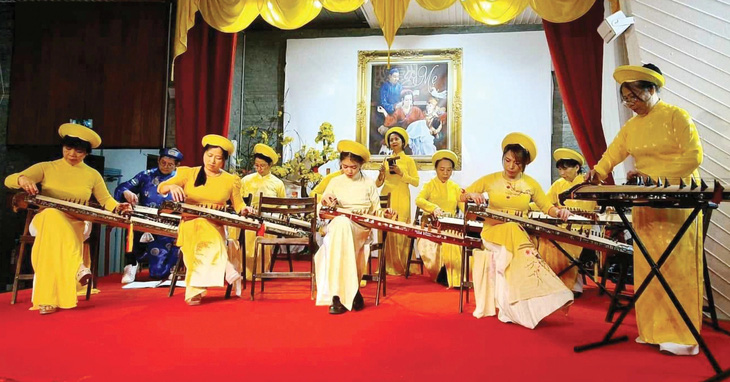
Professor Phuong Oanh (standing on the right) and the zither orchestra performed during the recording of two Christmas songs for the Vatican News program on the stage of the Vietnamese parish in Paris, France on the morning of November 11, 2023 - Photo: NVCC
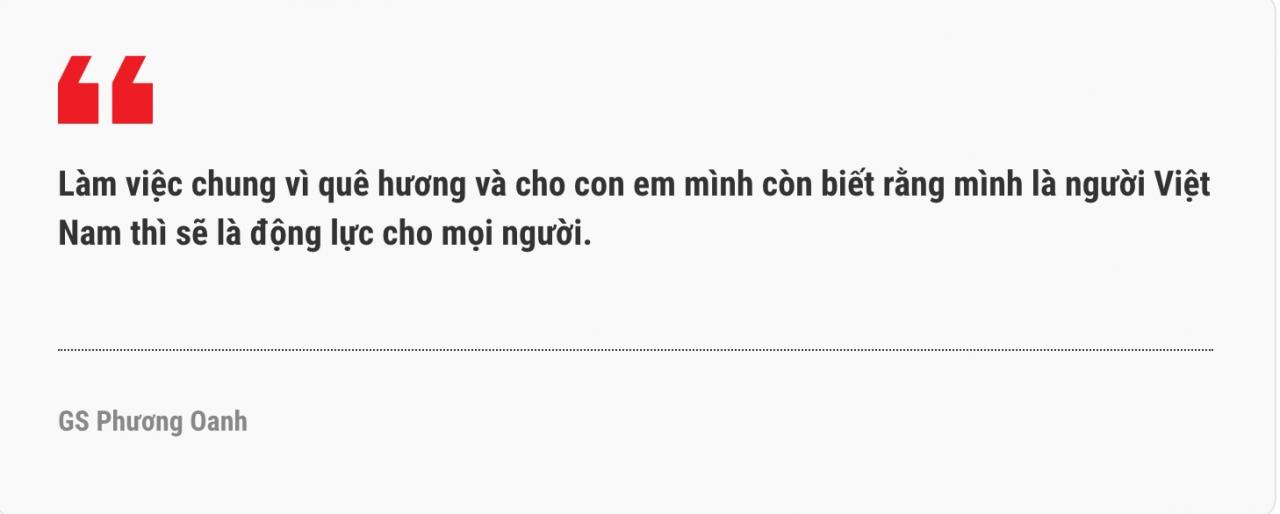
Passed on and kept the fire burning
Following her husband to settle in Norway at the age of 21, over the past 30 years, Huynh Phi Thuyen has built a "family music career" when all four mother and children are members of the Phuong Ca Na Uy group - the affectionate name of the Vietnamese folk music group in the capital Oslo, Norway from 2003 to present. The group is a place to teach folk music with the number of students usually maintained at around 30 - 40 people and Thuyen is the group leader. 20 years ago, when her eldest son Tin Tin was only 6 years old, Thuyen took him to Phuong Ca Na Uy's zither class. Later, Tin Tin was able to receive a third-level zither degree at a French music school thanks to studying with Professor Phuong Oanh and also play many other musical instruments such as Bau, Nhi, Sen, Kim. Later, Thuyen brought Tin Tin's two younger sisters, Uyen My and Quynh Vy, to study. Uyen My is now one of the two key members of the percussion section of the Phuong Ca group. In addition to the zither, she can also play the bamboo flute, the t'rung, the drum, and the senh tien. "I still remember the time when Professor Phuong Oanh, in just one evening, guided the members of Phuong Ca to learn how to play and play together using the sen and kim zithers that they had never held or practiced before. She did not talk much, but she built a movement to learn traditional music in France and many other countries. She inspired me to continue to stick with and accompany Phuong Ca Na Uy until today," said Ms. Thuyen. Although far from home, the national culture always has an extremely strong vitality, despite difficulties, all thanks to the hearts of those who live far away from home. The birth of the Phuong Ca Rennes branch, the 9th branch in the "big family" of Phuong Ca in many regions and countries, is one of those special stories.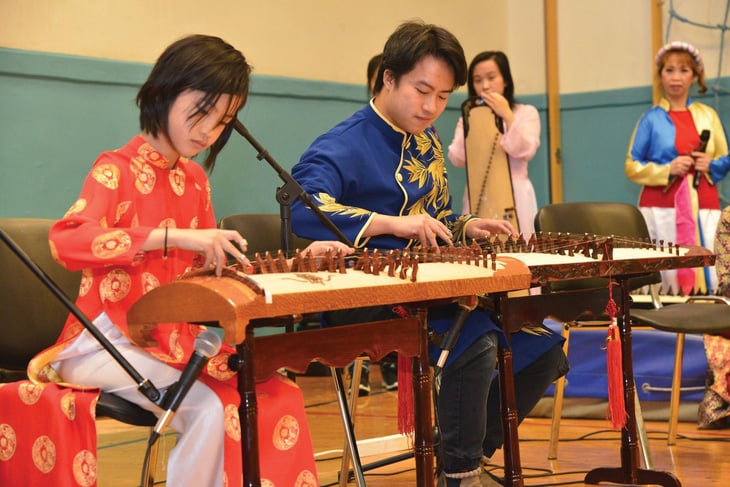
Young Royal Poinciana Quynh Vy was supported by Tin Tin - a grown Royal Poinciana - to perform the song "Autumn in the Homeland" by the group Phuong Ca Na Uy - Photo: NVCC
Pieces of time playing the piano
Ms. To Kim Thuong, leader of Phuong Ca Rennes group, is an administrative staff at a school. Her husband, Mr. Dao Tan Anh Truc, works as a technical repairman. They have three children, two girls and one boy. Ms. Thuong can only practice the instrument for about 15 minutes a day during their short breaks. For Mr. Truc, the "pieces" of time to play the instrument are even less because of his busy job as a technical staff. But he still tries to practice the zither, the zither and the guitar during those "scavenged" times of the day. "15 minutes is very precious to me," Ms. Thuong said. "Thanks to Professor Phuong Oanh, I find learning the instrument easy and interesting, and if I am patient and persistent, even with just 15 minutes a day, I can learn the zither." And then she not only overcame the obstacles herself, but also successfully made efforts to "pull" her two daughters, Tam Anh (13 years old) and Van Anh (11 years old), through the difficult "entry barrier" of the first three years of learning the zither.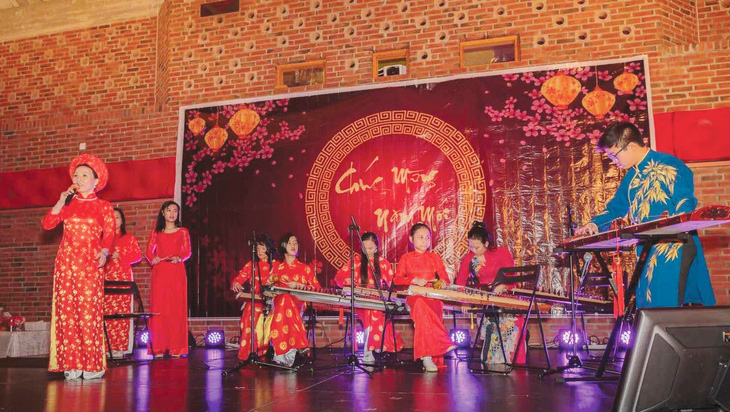
Journey on alluvial soil - performance by Phuong Ca Na Norway on the traditional New Year's Day of the Vietnamese community in Nedre Eiker province - Photo: NVCC
"Just 15 minutes a day"
"Can you spare 15 minutes a day?", that is the question Professor Phuong Oanh once asked Ms. Kim Thuong and also the question she would ask anyone who expressed that they wanted to learn to play an instrument but were afraid of not having time. If the answer is "yes", and it is usually the case, she affirms that they can absolutely do it. It is so simple and easy, right? It turns out that learning a musical instrument is not as difficult to start as many people think. With an understanding of the psychology of the learner, she "entices" them gently to help them overcome the first extremely important barrier. With a special sensitivity of a teacher, she always understands where the learner's ability is and will help them feel comfortable when picking up the instrument and practicing the first notes. She pays great attention to taking care of that initial confidence. Considering her students as relatives, she always receives warm feelings from them. How many times has she felt extremely happy when receiving messages like this from her students: "Thank you so much for being patient with us. I have to try harder to not let you down. Today's performance was beautiful and pleasing to the ears. It was the first time I performed on stage with you and other professionals. I loved it"; "Teacher, I didn't expect that thanks to you, we could play for more than 5 minutes. It sounded so good. Thank you"... No medal or reward could warm her heart like those messages.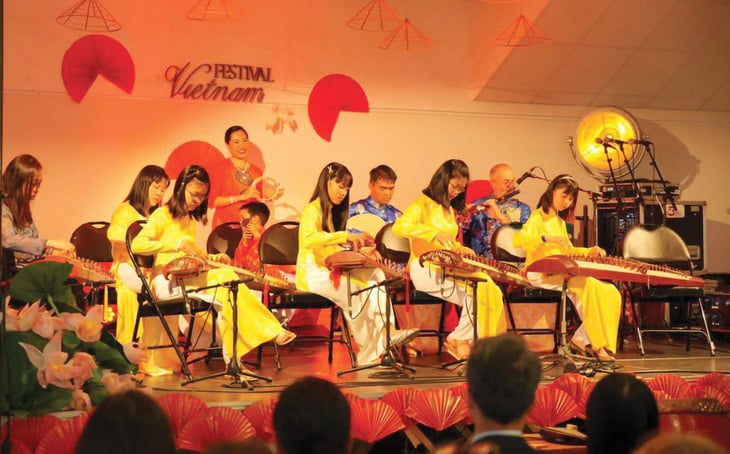
Phuong Ca Rennes band performs at the Vietnamese Ao Dai exhibition in Lorient province, western France - Photo: NVCC
Half a century of passing on the torch
With the skillful combination of the foundation of music transmission through oral and finger-passing with Western music notation and music theory, teachers in foreign countries like Professor Phuong Oanh can probably be counted on the fingers and will become increasingly rare. In early 1975, when she settled in France, she was the youngest teacher in the national music department. To unify the notation method in the school, the national music department established a drafting committee with designated teachers to re-transcribe all ancient pieces according to Western notes to help students learn more easily. Those who have studied the zither with both traditional and Western notation methods can feel the effective combination of these two methods with traditional musical instruments, especially the zither. The vibrato and pressing in the finger-passing of musical instruments are difficult to "formulate" into Do Re Mi because it is "tuned" by feelings and emotions, not by pitch or scale. Just as it is difficult to explain in detail when students ask her why the "swallows" (the name of the zither's frets) move and are not fixed like the guitar neck. On the other hand, if there are no more pieces transcribed into Western notation, the zither will have difficulty becoming more popular, and will also lack another extremely vibrant part of modern music.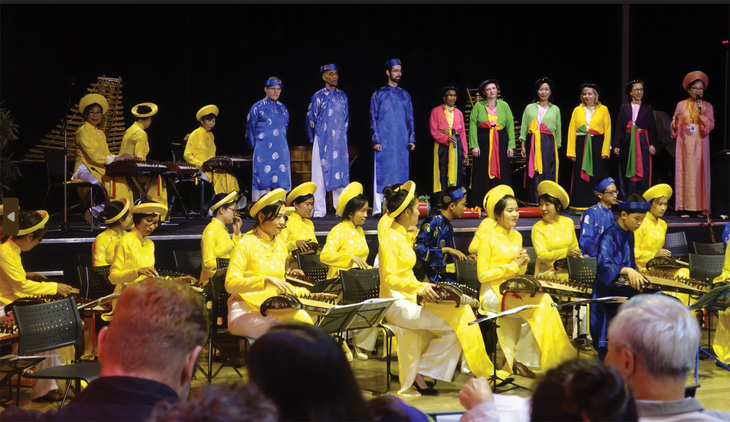
Professor Phuong Oanh and a Vietnamese folk music performance group with the participation of many foreign members in Paris, France - Photo: NVCC
Tuoitre.vn
Source


![[Photo] The Government Standing Committee works with ministries and branches on the real estate market situation.](https://vphoto.vietnam.vn/thumb/1200x675/vietnam/resource/IMAGE/2025/5/24/e9b5bc2313d14c9499b8c9b83226adba)



![[Photo] Ho Chi Minh City holds funeral for former President Tran Duc Luong](https://vphoto.vietnam.vn/thumb/1200x675/vietnam/resource/IMAGE/2025/5/24/9c1858ebd3d04170b6cef2e6bcb2019e)

















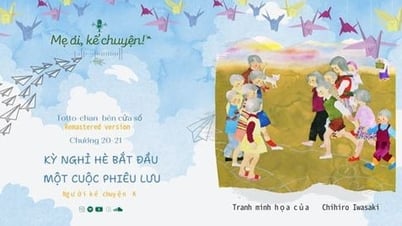













![[Photo] Party and State leaders visit former President Tran Duc Luong](https://vphoto.vietnam.vn/thumb/1200x675/vietnam/resource/IMAGE/2025/5/24/960db9b19102400e8df68d5a6caadcf6)































































Comment (0)